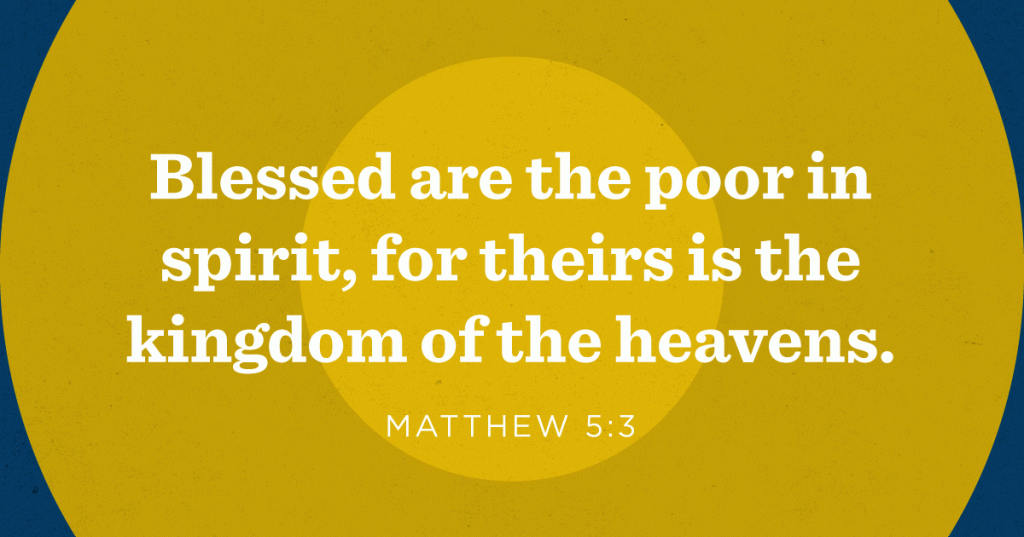What Does It Mean to Be Poor in Spirit?

Originally posted on the Bibles for America Blog.
As believers in Christ, we all desire to be under His blessing. In Matthew 5, Jesus said, “Blessed are the poor in spirit.” Have you ever wondered what that means and how it applies to you?
In this post, we’ll take a close look at this phrase in the Bible. With the help of notes from the New Testament Recovery Version, we’ll dig into the meaning of being poor in spirit and see how it applies to us today.
The background of this blessing
In the New Testament, each of the four gospels—Matthew, Mark, Luke, and John—presents Jesus’ life and work on earth from a different perspective. The Gospel of Matthew is the gospel of the kingdom and reveals Jesus Christ the Savior is the King.
Jesus came to this earth not to set up a physical, material, or political kingdom but to bring in a spiritual kingdom, the kingdom of the heavens.
In Matthew chapters 5 through 7, the Lord Jesus spoke a lengthy word to His disciples that has traditionally been called the Sermon on the Mount. But when you read these chapters, it’s easy to see that what Jesus spoke was extraordinary; it was much more than a mere sermon and has to do with His kingdom.
The Lord began with nine blessings that are known as the Beatitudes. The very first of these blessings is in verse 3:
“Blessed are the poor in spirit, for theirs is the kingdom of the heavens.”
To see what poor in spirit means, we’ll take a close look at each piece of the phrase separately: blessed, poor, and spirit.
Blessed are the poor in spirit
Let’s read the first part of note 1 on blessed in the New Testament Recovery Version. This note defines blessed and gives a brief overview of Matthew 5-7:
“The Greek word implies happy. It may also be rendered blessed and happy. So in succeeding verses. The word spoken by the new King, being the constitution of the kingdom of the heavens, is a revelation of the spiritual living and heavenly principles of the kingdom of the heavens. It is composed of seven sections. The first section, vv. 3-12, depicts the nature of the people of the kingdom of the heavens, who are under nine blessings.”
When we’re poor in spirit, we’re blessed and happy—not because of any outward, material benefits, since we see from the note that this verse is related to the kingdom of the heavens. The benefit we enjoy is something spiritual.
Poor in spirit
Now let’s consider the word poor. Since the Greek word for blessed implies happy, to be poor in spirit doesn’t mean we’re spiritually impoverished, or that before God we have nothing of spiritual value. How could we feel happy if that were the case? Actually, to be poor in spirit is something positive and profitable to our Christian lives.
Note 2 on poor in the Recovery Version says:
“To be poor in spirit is not only to be humble but also to be emptied in our spirit, not holding on to the old things of the old dispensation but unloaded to receive the new things, the things of the kingdom of the heavens.”
The old dispensation mentioned in this note refers to the dispensation, or age, of the Old Testament. Since the Lord’s first followers were Jews, His word about being poor in spirit was very important. If they had held onto the things of the Old Testament, they wouldn’t be able to receive all of the things of the New Testament. The disciples needed to be poor in spirit.
Today we believers should also be poor in spirit, which means we’re humble, emptied, and unloaded in our spirit, so we can receive something new from the Lord.
In spirit
Now we need to know what spirit refers to in Matthew 5:3. The spirit in this verse is our human spirit. This God-created deepest part of our being can contact and receive God, who is Spirit. Our human spirit has the capacity, the ability, to grasp spiritual things.
Note 3 on spirit explains:
“Spirit here refers not to the Spirit of God but to our human spirit, the deepest part of our being, the organ by which we contact God and realize spiritual things. We need to be poor, emptied, unloaded, in this part of our being that we may realize and possess the kingdom of the heavens. This implies that the kingdom of the heavens is spiritual, not material.”
For us to have the blessing of realizing and possessing the kingdom of the heavens, which is something spiritual, we need to be unloaded in our spirit.
A negative example
It may help us be impressed with the meaning and importance of being poor in spirit by considering the negative example of the scribes and Pharisees in the Gospels.
The scribes and Pharisees were experts in the law of God and the things of the Old Testament, yet they rejected Jesus Christ, the Savior. They opposed Him, the very One they studied about in the Old Testament who was present with them at that time. How could that be?
The scribes and Pharisees were proud, full, and occupied with the things of the Old Testament. They weren’t poor in spirit, so they couldn’t receive something new, namely, the new King and Savior and His kingdom.
The scribes and Pharisees didn’t see that God’s way had changed from the Old Testament to the New Testament, and that it was centered wholly on the wonderful person of Jesus. Instead, they hated Jesus and eventually had Him crucified.
We can learn a lot from this negative example. We certainly need to know the contents of the Bible, but we shouldn’t become proud or full of that knowledge, unable to receive something new from the Lord.
A positive example
In contrast to the scribes and Pharisees, the apostle Paul was a positive example of someone who was poor in spirit. In Philippians 3:13-14 Paul tesified:
“Brothers, I do not account of myself to have laid hold; but one thing I do: Forgetting the things which are behind and stretching forward to the things which are before, I pursue toward the goal for the prize to which God in Christ Jesus has called me upward.”
Note 2 on forgetting in verse 13 explains:
“In order to gain Christ to the fullest extent, Paul not only forsook his experiences in Judaism but also would not linger in his past experiences of Christ. He forgot the past. Not to forget but to linger in our past experiences, however genuine they were, frustrates our further pursuing of Christ.”
Paul didn’t want to be held back or prevented from experiencing and enjoying more of Christ. He desired to experience Christ to the fullest extent possible because he had received a revelation from God concerning how rich Christ is. In Ephesians 3:8 Paul said:
“To me, less than the least of all saints, was this grace given to announce to the Gentiles the unsearchable riches of Christ as the gospel.”
Paul saw that the Christ he loved is unsearchably rich in relation to who He is and in what He accomplished. He’s rich in love, holiness, righteousness, kindness, long-suffering, endurance, faithfulness, and so much more. He’s rich in all that He accomplished and attained in His birth, perfect human living, death, and resurrection.
So although Paul had enjoyed Christ very much up to the time of his writing the book of Philippians, he wasn’t content. He knew there was still so much of Christ to experience. He lived his Christian life continually forgetting what was behind and stretching forward to the new experiences of Christ before him.
What this means for us today
Each day the Lord gives us is full of opportunities to experience and enjoy Christ. Instead of trying to hold on to the previous day’s experiences or being content with them, we should come to the Lord Jesus with an unloaded spirit. Then when we spend time with Him in prayer and in the Word, we’ll enjoy Him in a fresh way and receive something new from Him.
But if we’re proud and think, “Oh, I already know what this verse says,” we won’t be able to receive what the Lord Jesus wants to speak to us at that moment.
Instead of having a proud attitude, we can exercise our spirit to pray, “Lord Jesus, don’t let me think I know what this verse means. Lord, empty me and unload me. Make me poor in spirit. I don’t want to miss Your fresh speaking to me.”
For theirs is the kingdom of the heavens
The Lord Jesus said that those who are poor in spirit are blessed—that is, happy—for theirs is the kingdom of the heavens.
Jesus didn’t say, “For theirs will be the kingdom of the heavens.” He said, “For theirs is the kingdom of the heavens.” This means we don’t have to wait to enjoy the kingdom of the heavens in the future; we can participate in it today.
As we come to the Lord Jesus and His Word emptied and unloaded of all we think we know, we can realize and possess the kingdom of the heavens every day. Since the kingdom of the heavens isn’t something material or physical but spiritual, it’s no wonder we must be poor in spirit to possess and enjoy it.
The kingdom of the heavens is a great and profound matter in the New Testament, especially in the Gospel of Matthew, and its significance can’t be covered in a single post. To gain more understanding of the kingdom of the heavens, we encourage you to read note 4 of Matthew 5:3 in the New Testament Recovery Version. This substantial note explains what the kingdom of the heavens is and is accompanied by many other verse references on the same topic. If you live in Australia, you can order a free copy of the New Testament Recovery Version here.
Subscribe to receive the latest posts






